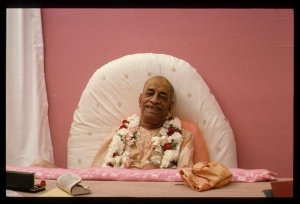CC Antya 6.279: Difference between revisions
m (1 revision(s)) |
(Vanibot #0054 edit - transform synonyms into clickable links, which search similar occurrences) |
||
| (One intermediate revision by one other user not shown) | |||
| Line 1: | Line 1: | ||
{{ | [[Category:Sri Caitanya-caritamrta - Antya-lila Chapter 06]] | ||
<div style="float:left">'''[[Sri Caitanya-caritamrta|Śrī Caitanya-caritāmṛta]] - [[CC Antya|Antya-līlā]] - [[CC Antya 6|Chapter 6: The Meeting of Śrī Caitanya Mahāprabhu and Raghunatha dasa Gosvāmī]]'''</div> | |||
<div style="float:right">[[File:Go-previous.png|link=CC Antya 6.278|Antya-līlā 6.278]] '''[[CC Antya 6.278|Antya-līlā 6.278]] - [[CC Antya 6.280|Antya-līlā 6.280]]''' [[File:Go-next.png|link=CC Antya 6.280|Antya-līlā 6.280]]</div> | |||
{{CompareVersions|CC|Antya 6.279|CC 1975|CC 1996}} | |||
{{RandomImage}} | |||
==== TEXT 279 ==== | ==== TEXT 279 ==== | ||
<div | <div class="verse"> | ||
viṣayīra anna haya | :viṣayīra anna haya 'rājasa' nimantraṇa | ||
dātā, bhoktā—duṅhāra malina haya mana | :dātā, bhoktā—duṅhāra malina haya mana | ||
</div> | </div> | ||
| Line 12: | Line 16: | ||
==== SYNONYMS ==== | ==== SYNONYMS ==== | ||
<div | <div class="synonyms"> | ||
''[//vanipedia.org/wiki/Special:VaniSearch?s=viṣayīra&tab=syno_o&ds=1 viṣayīra]'' — offered by materialistic men; ''[//vanipedia.org/wiki/Special:VaniSearch?s=anna&tab=syno_o&ds=1 anna]'' — food; ''[//vanipedia.org/wiki/Special:VaniSearch?s=haya&tab=syno_o&ds=1 haya]'' — is; ''[//vanipedia.org/wiki/Special:VaniSearch?s=rājasa&tab=syno_o&ds=1 rājasa]'' — in the mode of passion; ''[//vanipedia.org/wiki/Special:VaniSearch?s=nimantraṇa&tab=syno_o&ds=1 nimantraṇa]'' — invitation; ''[//vanipedia.org/wiki/Special:VaniSearch?s=dātā&tab=syno_o&ds=1 dātā]'' — the person who offers; ''[//vanipedia.org/wiki/Special:VaniSearch?s=bhoktā&tab=syno_o&ds=1 bhoktā]'' — the person who accepts such an offering; ''[//vanipedia.org/wiki/Special:VaniSearch?s=duṅhāra&tab=syno_o&ds=1 duṅhāra]'' — of both of them; ''[//vanipedia.org/wiki/Special:VaniSearch?s=malina&tab=syno_o&ds=1 malina]'' — contaminated; ''[//vanipedia.org/wiki/Special:VaniSearch?s=haya&tab=syno_o&ds=1 haya] [//vanipedia.org/wiki/Special:VaniSearch?s=mana&tab=syno_o&ds=1 mana]'' — the mind becomes. | |||
</div> | </div> | ||
| Line 19: | Line 23: | ||
==== TRANSLATION ==== | ==== TRANSLATION ==== | ||
<div | <div class="translation"> | ||
"When one accepts an invitation from a person contaminated by the material mode of passion, the person who offers the food and the person who accepts it are both mentally contaminated. | |||
</div> | </div> | ||
| Line 26: | Line 30: | ||
==== PURPORT ==== | ==== PURPORT ==== | ||
<div | <div class="purport"> | ||
Śrīla Bhaktivinoda Ṭhākura says that there are three varieties of invitations—those in the mode of goodness, those in passion and those in ignorance. An invitation accepted from a pure devotee is in the mode of goodness, an invitation accepted from a person who is pious but materially attached is in the mode of passion, and an invitation accepted from a person who is materially very sinful is in the mode of ignorance. | Śrīla Bhaktivinoda Ṭhākura says that there are three varieties of invitations—those in the mode of goodness, those in passion and those in ignorance. An invitation accepted from a pure devotee is in the mode of goodness, an invitation accepted from a person who is pious but materially attached is in the mode of passion, and an invitation accepted from a person who is materially very sinful is in the mode of ignorance. | ||
</div> | </div> | ||
__NOTOC__ | |||
<div style="float:right; clear:both;">[[File:Go-previous.png|link=CC Antya 6.278|Antya-līlā 6.278]] '''[[CC Antya 6.278|Antya-līlā 6.278]] - [[CC Antya 6.280|Antya-līlā 6.280]]''' [[File:Go-next.png|link=CC Antya 6.280|Antya-līlā 6.280]]</div> | |||
__NOTOC__ | |||
__NOEDITSECTION__ | |||
Latest revision as of 20:49, 19 February 2024

A.C. Bhaktivedanta Swami Prabhupada
TEXT 279
- viṣayīra anna haya 'rājasa' nimantraṇa
- dātā, bhoktā—duṅhāra malina haya mana
SYNONYMS
viṣayīra — offered by materialistic men; anna — food; haya — is; rājasa — in the mode of passion; nimantraṇa — invitation; dātā — the person who offers; bhoktā — the person who accepts such an offering; duṅhāra — of both of them; malina — contaminated; haya mana — the mind becomes.
TRANSLATION
"When one accepts an invitation from a person contaminated by the material mode of passion, the person who offers the food and the person who accepts it are both mentally contaminated.
PURPORT
Śrīla Bhaktivinoda Ṭhākura says that there are three varieties of invitations—those in the mode of goodness, those in passion and those in ignorance. An invitation accepted from a pure devotee is in the mode of goodness, an invitation accepted from a person who is pious but materially attached is in the mode of passion, and an invitation accepted from a person who is materially very sinful is in the mode of ignorance.